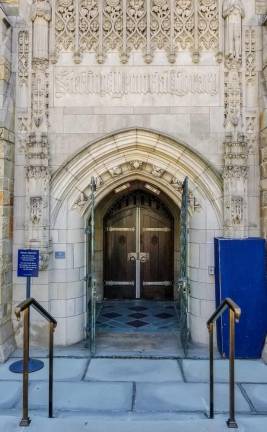Under (Ivy League) Pressure

In second grade, a girl in my class replaced her family’s computer desktop image with a photo of Yale, announcing that she wouldn’t change it again until she got into Yale as a senior. Two years later, in fourth grade, I sat at a lunch table with my friends, debating which modern language to study in fifth grade, based entirely on which would look better on a college application.
The college admissions process has weighed on us since we sat in our second grade classroom, announcing which Ivy League school we would go to. I proclaimed that I was bound for Harvard, the girl next to me said she was going to Princeton, the girl across from me that she was destined for Dartmouth. The expectation, even then, was to go to an Ivy, presumed by a private school that prides itself on its college placement record and by a generation of parents who equate the Ivys with success.
Stress, Tears and Bad Cafeteria Coffee
The pressure to attend a top-tier college never lets up. The bar is perilously high; we need to get perfect grades, join school clubs, find leadership positions, do extracurriculars, and get high scores on various standardized tests. The mother of a friend of mine took her to a college counselor at age 14, who asked if she might want to found a non-profit or to publish a book to bolster her resume. We aim to do every activity available, regardless of stress levels or interest or time, out of that same fear of not having enough to write in all of those blank spaces on that college application.
For four years of high school we are consumed by this need to do as much as possible, to pick an interest and run with it, to “be a spike” in order to market ourselves. We choose activities that will look best on paper rather than following our interests, joining Model UN and Debate because they sound more impressive than comedy club or film club. We become obsessed with maintaining our grades: grounded for our Bs, crying in bathrooms over bad math quizzes, skipping lunch to study, surviving on bad cafeteria coffee after a night of choosing an essay over sleep. We forfeit four years of our lives in preparation for the promise of the next four.
It's All About Status
The harsh truth, one that has hovered quietly over my classmates and me for years, is that only so many of us from the same high school can go to each college. The result is a quiet competitiveness. Only a few students can be at the top of our class, there can only be one head of a club, only two class presidents. I spend every day surrounded by girls who are violin prodigies, math geniuses, or fluent in three languages. But in an environment where everyone is astoundingly smart, there is always a need to prove oneself, and this need manifests in what college you go to.
To attend an Ivy League is to prove yourself to your peers, your teachers, your family. We have been led to believe that the prestige of the college we attend is the measure of our intelligence and success, and that has become the one true way to assert intellect in a highly competitive environment; the name on our sweatshirts has become the ultimate marker of our intelligence.
The heart of this pressure is based, not on the quality of the university, but rather on its status. The goal is not to attend a college where you would get the best education or where you would be happiest, but to go a college that your school can boast about, that your parents can tell their friends you attend, and which will, eventually, look best on a job application. The emphasis is on name-value alone. People wear sweaters with a Gucci logo across their chest in the same way one might wear a Harvard sweater: the former to establish one’s wealth, the latter one’s intelligence. The schools we named in that second grade classroom, those elite Ivys, are the primary goal for us as high schoolers, because we have been taught to equate not only the college’s worth, but our own, with where we get in.